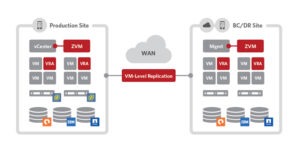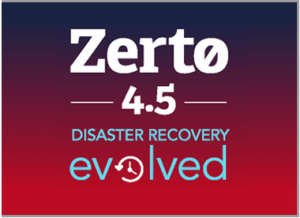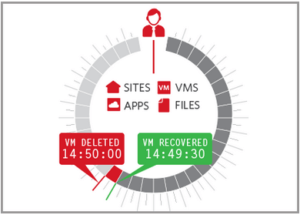Zert0 – products for enterprises
Products for enterprises

Zerto Virtual Replication
Avoid costly downtime by simplifying disaster recovery, management, and testing implementations. Even for complex applications, Zerto Virtual Replication can be installed within an hour. Using hypervisor-level replication, Zerto simplifies replication and recovery with up to three clicks.
Why do I need hypervisor-level replication?
Hypervisor-based replication
Discover technology that changes business continuity and disaster recovery in virtualized environments, enabling customers to take full advantage of virtualization. Hypervisor-level replication, unlike storage and LUN-based solutions, provides greater flexibility, control, and cost savings in managing mission-critical applications.
Supported platforms:
- DR as a Service
- Replication for Amazon Web Services
- Replication for VMWare vSphere
- Replication for Microsoft Hyper-V
About the solution
Zert0 offers a virtual-aware, software-only, first-class enterprise-grade replication solution built specifically for virtual environments.
By placing replication at the top of the stack, from storage to hypervisor, Zerto has created the first and only replication solution that provides enterprise-class virtual replication and BC/DR capabilities for data centers and cloud systems.
Zerto Architecture: Simple, efficient, and virtualization-ready.
At the heart of this patented replication technology are two key components:
- Zerto Virtual Manager (ZVM) — ZVM connects directly to a virtual management console (such as VMware’s VCenter) to ensure availability to the entire infrastructure. ZVM is the nerve center of the solution, managing replications of the entire vSphere domain and tracking application route and information movement in real time.
- Virtual Replication Appliance (VRA) – A VRA is a software module that is automatically deployed to physical hosts. VRA continuously duplicates data from user-selected virtual machines, compressing and sending this data to a remote site over WAN links.
Key differences between hypervisor-based replication are:
Because the hypervisor is installed directly inside the virtual infrastructure (as opposed to individual machines), the VRA can connect to the virtual machine’s I/O stream. Therefore, every time a virtual machine writes to its virtual disks, the write command is intercepted, cloned, and sent to the recovery location.
Unlike some replication technologies that primarily protect data with bulky snapshots and the backup paradigm, Zerto provides continuous replication with zero impact on application performance.
Hypervisor-based replication is completely independent of the source of storage and destination, natively supports all storage platforms and the full breadth of capabilities made possible by virtualization, as well as high availability, clustering, and the ability to localize and replicate volumes.
Advantages of the hypervisor
Hypervisor-based replication offers many important benefits:
- Granularity: The ability to replicate at the correct level any virtual entity, whether it is a single virtual machine, a group of virtual machines, or a virtual application (for example, VMWare VApp). With Zerto, you’ll take your backup beyond simple backups.
- Scalability: Zerto’s hypervisor-based replication solution is software-based, so it can be deployed and easily managed, no matter how fast or how much the infrastructure expands. The solution also allows administrators to perform operations and configure policies at the virtual machine or application level.
- Easy to manage: Without any guest-host requirements, or additional hardware, the Zerto solution is easily manageable. It simply resides in a hypervisor, allowing centralized management through a virtual management console (such as VMWare vCenter).
- Move servers and storage: Hypervisor-based replication alone allows you to quickly move virtual machines from one physical server or logical array (data store) to another while maintaining full replication.
- Hardware Independence: Hypervisor-based replication is hardware-independent, supports all storage arrays, including Storage Area Networks (SANs) and Network Attached Storage (NAS), as well as virtual disk types such as Raw Device Mapping (RDM) and VMWare File System (VMFS).
- RPO and RTO: When using a Zerto solution for hypervisor-based replication, the Estimated Recovery Time (RPO) is measured in seconds and The Allowable Downtime (RTO) is measured in minutes.
Cloud Continuity Platform
Zerto Cloud Continuity Platform migrates data between completely dissimilar infrastructures with the same, easy-to-use management interface. Data protection must be able to change and grow, no matter how the infrastructure changes depending on the data, whether it is private, managed or public clouds using any hypervisor or storage system.
Zerto Virtual Replication 4.5 Update

What’s New in ZVR 4.5
Zerto Virtual Replication 4.5 builds on our always on replication without creating snapshots. Replication and orchestration capabilities are performed with the addition of granular (fractional) data recovery. Now, a single file or folder can be recovered from the log, improving the average recovery time for files, folders, virtual machines, applications, and sites.

ZVR 4.5 Feature Analysis
Zerto Virtual Replication (ZVR) is the only hypervisor-based, forward-looking all-in-one data replication and recovery solution that makes disaster recovery simple and scalable. With our release of ZVR 4.5, we’ve added new features that provide powerful data protection capabilities and enable IT professionals to provide an unprecedented level of service for routine data recovery requests.